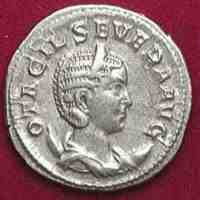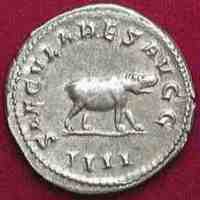
Otacilia Severa, wife of Emperor Philip I, "the Arab."
Coin dated 247/248 AD
|
Roman Civilization
Spring 2001
|

games for Rome's 1000th birthday and the new Saeculum,about
110 years in length
|
Instructor: Dr. Victor A. Leuci
Newnham Hall 37
592-5324
Home (573) 815-9333 (not after 10:00 pm)
e-mail: leuciv@jaynet.wcmo.edu
Hoime page: www.wcmo.edu/homepages/faculty/leuciv/index.html
Office Hours: (Jan. 15 to April 27) MWF 9:00-11:00 a.m., Th.
noon-1:00 p.m., and by appointment
Texts:
R. B. Kebric, Roman People, 2nd edition. Mayfield(Kebric)
C. Scarre, The Penguin Historical Atlas of Ancient Rome, Penguin
1995 (Scarre)
Jo-Ann Shelton, As the Romans Did, 2nd edition. Oxford 1998
(Shelton)
Links for materials to support this course:
The syllabus also provides links to various sites
Objectives: The course is a survey of ancient
Roman life and thought. Our goals are to:
-
establish a basic understanding of ancient Roman culture and daily life;
-
understand how everyday life of the different social classes was affected
by politics, economics, societal norms, and the culture;
-
appreciate the literature and art produced by Rome and its significance;
-
understand the evolution of political and religious systems in Roman history;
-
understand how the political, economic, religious, cultural, and social
aspects of ancient Rome were related and integrated;
-
appreciate how ancient Roman culture is similar to and different from contemporary
culture, providing roots for much of our modern Western culture; and
-
learn to reach and defend positions based on careful analysis of primary
sources and thoughtful and judicious use of secondary sources (with an
awareness of how and why the secondary sources agree and disagree).
Relationship to the General Education Curriculum: Roman Civilization
228 satisfies one of the two courses required within the Historical Perspectives
Context of Tier II. As stated in the course objectives, Roman Civilization
228 provides students with opportunities to immerse themselves in the ancient
Roman culture and daily life, learning how it evolved politically, socially,
culturally, and economically over time. Mastering an understanding of a
culture’s art, architecture, literature, philosophy, science, economics,
politics, and religion offers opportunities for reflection on varying cultural,
social, and historical traditions including work, family, voluntary associations,
government. The course will also foster an awareness of the role of values
in decision making, search for meaning and identity, and the ethical issues
of society. Much of this will be accomplished through the study of certain
"archetypal" individuals from the time period covered. Students should
also gain insight into ways their culture is similar to and different from
the ancient Roman culture. It is intended that students will acquire a
deeper understanding of the breadth of our human experience and heritage
over the expanse of Roman history. Also intended is the understanding of
the interrelationships of the political, social, artistic, cultural, intellectual,
religious, and scientific aspects of life in ancient Rome. Finally, it
is expected that students will gain a greater respect for other peoples
and cultures because of their study of ancient Roman civilization. Through
this course, students will develop a propensity for historical methods
of study that lead to an understanding of patterns and meaning in history.
The teaching and use of historical methods will be key for much of the
above discussions, examinations, and analysis. It is expected that the
students will be able to reach and defend their own positions based on
careful analysis of primary sources (keeping in mind that many of our ‘primary’
sources for this time period are, in fact, secondary to varying degrees)
and thoughtful and judicious use of secondary sources.
Format: The course will rely primarily on
discussion with some lecture. We may also explore certain aspects of Roman
life via the Web. Certain course information regarding assignments will
also be posted to the web page created for this course and will also be
available via a discussion group in Exchange. More than two unexcused absences
will be considered excessive and will factor in determining your grade.
No make-up work will be accepted for unexcused absences.
Grading: 3 exams (100 pts each); final (50
pts); 5-6 microthemes (500-800 words; 25 pts each). In addtion
10% of your grade will be based on class participation, attendance, web
discussion, etc. Specific due dates for the microthemes will be announced
at least one week in advance. I expect you to abide by Westminster’s
honor code.
Exams and final: The exams will be
a combination of fill-in the blank or short answer with essays. Usually
there will be 10-15 fill in the blank questions worth 2 points each and
two long essays worth 35 to 40 points each. The final will be half of a
regular exam. The essays should be well written in standard paragraph format
and replete with pertinent facts to support your thesis (or theses). The
average length for a good essay should be 300 to 400 words long. Usually
a review sheet will be posted in the discussion folder and available on
the web one week before an exam as an aid in your preparation.
Writing Intensive
Option: Several different types of writing will be part of the
course: microthemes and three to four exams that are predominately essay
(two of which must be the take-home versions). Two to six microthemes will
be assigned as a means to help participants come to a better understanding
of important themes, ideas, and concepts. The second and third microthemes
will be revised on the basis of a conference with a tutor at the Writing
Lab; one will be revised on the basis of a conference with me. Through
conference sessions each student will develop and refine the paper topic.
A critique and conference after the completion of the paper may also occur.
In general, participants in the class should highly consider using the
services of the Writing Lab and especially the Lab tutors, who can be of
tremendous assistance.
Papers:
Content: The microthemes will focus on
a specific question which will be narrow in focus--your paper should be
corresponding “narrow” and will be an opportunity for you to apply historical
methods. The thesis you maintain in your paper should be supported with
facts from the readings and with quotes where appropriate. The paper, however,
should not be one long quotation. They are intending to be opportunities
for you to examine certain topics and to come up with reasonable responses,
i.e. responses that are based on reason and that can be supported by the
information which you have covered in this class.
Formatting:
-
Start with a simple heading at the top of the page giving your name, name
of class, question you are answering, etc.
-
Make sure your heading also includes the word count
-
In general use the MLA formatting.
-
For references from Shelton give the example number, e.g. Shelton #64,
and the page number when the example is sufficiently long, e.g. Shelton
#321, p.280
-
Organization, style, grammar, and spelling all can aid or detract from
the persuasiveness of your argumentation and can affect your grade.
Assignments: The assignments given below are
not “set-in-stone,” and may vary depending on how each class period goes.
The syllabus will be updated as needed. Another place to check for changes
in the syllabus will be the Roman Civ. folder in the Discussion Groups
folder in Exchange.
Unit I: From Romulus to the Rubicon (753-49 BC)
-
Reading assignments (click
here for specific due dates):
-
Kebric, Chapters 1-2
-
Scarre, pp. 12-15, 20-27, and 49 (map)
-
Shelton, Chapters I; IV # 79-96 (pp. 59-71); VIII-IX; XV #402-404 (pp.
360-363), #412-428 (pp. 369-386), and #455-459 (pp. 417-420)
Unit II: From Caesar to Vespasian (49 BC - 69 AD)
Unit III: From Vespasian to Constantine (69 - 337 AD)
-
Reading Assignments (click
here for specific due dates):
-
Kebric, Chapters 6-9
-
Scarre, 56-57, 60-61, 64-73, 88-127
-
Shelton, Chapters V #109-133 (pp. 85-99), and XV #444-453 (pp. 406-416)
Unit IIII: Leisure and Entertainment



